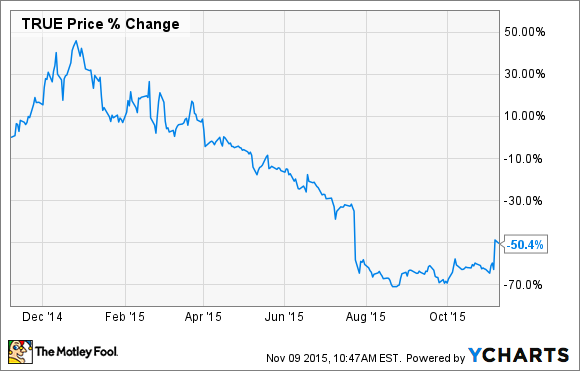It's been a slippery slope for shareholders of TrueCar (TRUE 2.03%) over the past 12 months. Investors were filled with doubt, wondering if its business model was broken as it tried to play middleman between consumers and dealerships -- a touchy relationship that led some dealerships to file lawsuits against TrueCar this summer.
While many investors have pressed the panic button and bailed out of their investments in the young company, TrueCar jumped roughly 30% higher Friday after its third-quarter results reassured the market that the best may be yet to come. Here's a quick look at the numbers, and three things investors need to know.
By the numbers
TrueCar reported a loss of $11.1 million or $0.13 per share, smaller than last year's third-quarter loss of $13.6 million or $0.18 per share. Excluding stock-based compensation and other items, TrueCar's loss comes out to $0.03 per share, better than analyst estimates of a $0.05 per-share loss. While TrueCar beat expectations, those figures don't do its third quarter justice.
TrueCar's average monthly unique visitors also posted another very healthy quarter of growth, continuing its string of sequential quarterly growth rates above 40%.

Graphic source: TrueCar's third-quarter earnings presentation.
That boost in traffic helped drive TrueCar's third-quarter transactions, which totaled 208,034 units from the company's network of certified dealers. A 21% year-over-year increase in transactions drove revenue 28% higher to a record $72.4 million, far ahead of the $66.2 million analysts had forecast. Part of the reason for TrueCar's larger-than-expected increase in revenue during the quarter was that it increased its monetization from each transaction to $324, up from last quarter's $317, and significantly up from last year's $303.
All of those positive factors fueled a rebound in TrueCar's adjusted EBITDA results.

Graphic source: TrueCar's third-quarter earnings presentation.
With the basic numbers out of the way, let's review the three interesting takeaways.
Losing AutoNation was no big deal
When AutoNation (AN 0.81%) and TrueCar decided to end their partnership, many investors were worried it would negatively impact TrueCar. That's because AutoNation at the time owned roughly 250 stores, and is the nation's largest new-car retailer. However, TrueCar has the leverage in this situation. Consumers won't stop using TrueCar because it doesn't have a connection with AutoNation dealerships; rather, TrueCar is simply directing its consumers to other dealerships close by that remain in its network. In the graph below, you can see exactly how this scenario unfolded, with TrueCar's network of dealerships declining, but revenue per dealership increasing.

Graphic source: TrueCar's third-quarter earnings presentation.
Investors who are worried that AutoNation might just be the first of many dealership groups to bail on TrueCar's network should relax. AutoNation, as the nation's largest new-car retailer, has the capital to create its own website that offers consumers an online-buying service similar to TrueCar. It also has a major dealership footprint -- its store count will reach roughly 300 after recent acquisitions are completed -- that will allow it to pool vehicle inventory and offer consumers options from many dealerships on its own. Very few other dealership groups have such advantages, which means most are unlikely to walk away from TrueCar.
Litigation problems are fading
While TrueCar and AutoNation were having their not-so-private breakup, several dealership groups were filing lawsuits against TrueCar for multiple reasons. In one, 117 new-car dealership franchises outside of TrueCar's dealership network sued the company for a total of more than $250 million. The dealerships claimed they were losing three to seven vehicle sales a month because TrueCar was funneling sales leads to its own dealership network; yes, TrueCar was essentially being sued for being good at what it does.
That lawsuit, along with four others that were filed between March and September of this year, received much attention; the cost of losing them would have sunk a pothole into TrueCar's earnings. Fortunately, as management noted on its third-quarter conference call, two of these lawsuits have already been dismissed, and TrueCar believes it complies with all laws and regulations. So while investors should keep an eye on these litigation issues going forward, the dismissed lawsuits give them reason to remain optimistic that the remaining litigation won't be an issue.
A rising tide lifts all dealerships
TrueCar is positioned to benefit from a surging U.S. automotive industry. The company projects that U.S. revenue from sales of new vehicles last month reached a record high for October, up more than 11% to $46 billion. In fact, October marked the 22nd consecutive month of record-setting revenue, and the seasonally adjusted annual rate of new-vehicle sales continues to move higher.

Graphic by author. Information source: Automotive News DataCenter.
The reason that's great news for TrueCar is that as the total number of new-vehicle purchases continues to move higher, the company will be able to grow its number of transactions even without increasing its market share. Furthermore, it's likely that TrueCar can expand its market share because sales of utilities and pickup trucks -- which command much higher price tags and thus incentivize consumers to take advantage of TrueCar's pricing transparency -- are still very strong.
TrueCar's third quarter was solid, in just about every aspect. In addition to the stock posting better adjusted EBITDA, it's also great for investors to see that new-vehicle sales in the U.S. are trending higher, TrueCar's litigation woes are fading, and that losing AutoNation didn't negatively impact the company.






